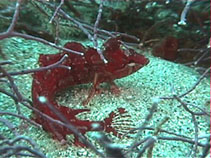| Family: |
Clinidae (Clinids) |
| Max. size: |
11 cm TL (male/unsexed) |
| Environment: |
demersal; marine; depth range - 21 m |
| Distribution: |
Eastern Pacific: British Columbia, Canada to northern Baja California, Mexico. |
| Diagnosis: |
Dorsal spines (total): 34-36; Dorsal soft rays (total): 5-8; Anal spines: 2-2; Anal soft rays: 23-28; Vertebrae: 49-51. Caudal rounded (Ref. 6885). Color variable with several phases, reddish, green, dark and silver bars, which intermix freely; there is usually a strong dark ocellus above the lateral line canal behind the pectoral fin and there may be additionally several series of dark spots of various intensities; fins weakly pigmented at bases, anal and pectorals most so; head often with pigment bars radiating from eye (Ref. 6885). |
| Biology: |
Occurs in inshore rocky areas in algae, usually on exposed coast. |
| IUCN Red List Status: |
Least Concern (LC); Date assessed: 04 May 2010 Ref. (130435)
|
| Threat to humans: |
harmless |
Source and more info: www.fishbase.org. For personal, classroom, and other internal use only. Not for publication.
